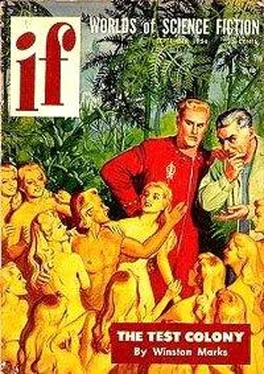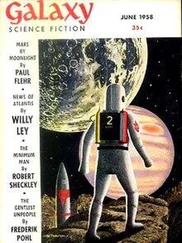Robert Sheckley - The Battle
Здесь есть возможность читать онлайн «Robert Sheckley - The Battle» весь текст электронной книги совершенно бесплатно (целиком полную версию без сокращений). В некоторых случаях можно слушать аудио, скачать через торрент в формате fb2 и присутствует краткое содержание. Город: Buffalo, Год выпуска: 1954, Издательство: Quinn Publishing Company, Inc.; Buffalo, NY, Жанр: Юмористическая фантастика, на английском языке. Описание произведения, (предисловие) а так же отзывы посетителей доступны на портале библиотеки ЛибКат.
- Название:The Battle
- Автор:
- Издательство:Quinn Publishing Company, Inc.; Buffalo, NY
- Жанр:
- Год:1954
- Город:Buffalo
- ISBN:нет данных
- Рейтинг книги:4 / 5. Голосов: 1
-
Избранное:Добавить в избранное
- Отзывы:
-
Ваша оценка:
- 80
- 1
- 2
- 3
- 4
- 5
The Battle: краткое содержание, описание и аннотация
Предлагаем к чтению аннотацию, описание, краткое содержание или предисловие (зависит от того, что написал сам автор книги «The Battle»). Если вы не нашли необходимую информацию о книге — напишите в комментариях, мы постараемся отыскать её.
The Battle — читать онлайн бесплатно полную книгу (весь текст) целиком
Ниже представлен текст книги, разбитый по страницам. Система сохранения места последней прочитанной страницы, позволяет с удобством читать онлайн бесплатно книгу «The Battle», без необходимости каждый раз заново искать на чём Вы остановились. Поставьте закладку, и сможете в любой момент перейти на страницу, на которой закончили чтение.
Интервал:
Закладка:
The Battle
by Robert Sheckley
Supreme General Fetterer barked “At ease!” as he hurried into the command room. Obediently, his three generals stood at ease.
“We haven’t much time,” Fetterer said, glancing at his watch. “We’ll go over the plan of battle again.”
He walked to the wall and unrolled a gigantic map of the Sahara Desert.
“According to our best theological information, Satan is going to present his forces at these co-ordinates.” He indicated the place with a blunt forefinger. “In the front rank there will be the devils, demons, succubi, incubi, and the rest of the ratings. Bael will command the right flank, Buer the left. His Satanic Majesty will hold the centre.”
“Rather medieval,” General Dell murmured.
General Fetterer’s aide came in, his face shining and happy with the thought of the Coming.
“Sir,” he said, “the priest is outside again.”
“Stand to attention, soldier,” Fetterer said sternly. “There’s still a battle to be fought and won.”
“Yes sir,” the aide said, and stood rigidly, some of the joy fading from his face.
“The priest, eh?” Supreme General Fetterer rubbed his fingers together thoughtfully. Ever since the Coming, since the knowledge of the imminent Last Battle, the religious workers of the world had made a complete nuisance of themselves. They had stopped their bickering, which was commendable. But now they were trying to run military business.
“Send him away,” Fetterer said. “He know we’re planning Armageddon.”
“Yes sir,” the aide said. He saluted sharply, wheeled, and marched out.
“To go on,” Supreme General Fetterer said. “Behind Satan’s first line of defence will be the resurrected sinners, and various elemental forces of evil. The fallen angels will act as his bomber corps. Dell’s robot interceptors will meet them.”
General Dell smiled grimly.
“Upon contact, MacFee’s automatic tank corps will proceed towards the centre of the line. MacFee’s automatic tank corps will proceed towards the centre,” Fetterer went on, “supported by General Ongin’s robot infantry. Dell will command the H bombing of the rear, which should be tightly massed. I will thrust with the mechanised cavalry, here and here.”
The aide came back, and stood rigidly at attention. “Sir,” he said, “the priest refuses to go. He says he must speak with you.”
Supreme General Fetterer hesitated before saying no. He remembered that this was the Last Battle, and that the religious workers were connected with it. He decided to give the man five minutes.
“Show him in,” he said.
The priest wore a plain business suit, to show that he represented no particular religion. His face was tired but determined.
“General,” he said, “I am a representative of all the religious workers of the world, the priests, rabbis, ministers, mullahs, and all the rest. We beg of you, General, to let us fight in the Lord’s battle.”
Supreme General Fetterer drummed his fingers nervously against his side. He wanted to stay on friendly terms with these men. Even he, the Supreme Commander, might need a good word, when all was said and done …
“You can understand my position,” Fetterer said unhappily. “I’m a general. I have a battle to fight.”
“But it’s the Last Battle,” the priest said. “It should be the people’s battle.”
“It is,” Fetterer said. “It’s being fought by their representatives, the military.”
The priest didn’t look at all convinced.
Fetterer said, “You wouldn’t want to lose this battle, would you? Have Satan win?”
“Of course not,” the priest murmured.
“Then we can’t take any chances,” Fetterer said. “All the governments agreed on that, didn’t they? Oh, it would be very nice to fight Armageddon with the mass of humanity. Symbolic, you might say. But could we be certain of victory?”
The priest tried to say something, but Fetterer was talking rapidly.
“How do we know the strength of Satan’s forces? We simply must put forth our best foot, militarily speaking. And that means the automatic armies, the robot interceptors and tanks, the H bombs.”
The priest looked very unhappy. “But it isn’t right ,” he said. “Certainly you can find some place in your plan for people ?”
Fetterer thought about it, but the request was impossible. The plan of battle was fully developed, beautiful, irresistible. Any introduction of a gross human element would only throw it out of order. No living flesh could stand the noise of that mechanical attack, the energy potentials humming in the air, the all-enveloping fire power. A human being who came within a hundred miles of the front would not live to see the enemy.
“I’m afraid not,” Fetterer said.
“There are some,” the priest said sternly, “who feel that it was an error to put this in the hands of the military.”
“Sorry,” Fetterer said cheerfully. “That’s defeatist talk. If you don’t mind—” He gestured at the door. Wearily the priest left.
“These civilians,” Fetterer mused. “Well gentlemen, are your troops ready?”
“We’re ready to fight for Him,” General MacFee said enthusiastically. “I can vouch for every automatic in my command. Their metal is shining, all relays have been renewed, and the energy reservoirs are fully charged. Sir, they’re positively itching for battle!”
General Ongin snapped fully out of his daze. “The ground troops are ready, sir!”
“Air arm ready,” General Dell said.
“Excellent,” General Fetterer said. “All other arrangements have been made. Television facilities are available for the total population of the world. No one, rich or poor, will miss the spectacle of the Last Battle.”
“And after the battle—” General Ongin began, and stopped. He looked at Fetterer.
Fetterer frowned deeply. He didn’t know what was supposed to happen after the Battle. That part of it was, presumably, in the hands of the religious agencies.
“I suppose there’ll be a presentation or something,” he said vaguely.
“You mean we will meet—Him?” General Dell asked.
“Don’t really know,” Fetterer said. “But I should think so. After all—I mean, you know what I mean?”
“But what should we wear?” General MacFee asked, in a sudden panic. “I mean, what does one wear?”
“What do the angels wear?” Fetterer asked Ongin.
“I don’t know,” Ongin said.
“Robes, do you think?” General Dell offered.
“No,” Fetterer said sternly. “We will wear dress uniform, without decorations.”
The generals nodded. It was fitting.
And then it was time.
Gorgeous in their battle array, the legions of Hell advanced over the desert. Hellish pipes skirled, hollow drums pounded, and the great host moved forward.
In a blinding cloud of sand, General MacFee’s automatic tanks hurled themselves against the satanic foe. Immediately, Dell’s automatic bombers screeched overhead, hurling their bombs on the massed horde of the damned. Fetterer thrust valiantly with his automatic cavalry.
Into this mêlée advanced Ongin’s automatic infantry, and metal did what metal could.
The hordes of the damned overflowed the front, ripping apart tanks and robots. Automatic mechanisms died, bravely defending a patch of sand. Dell’s bombers were torn from the skies by the fallen angels, led by Marchocias, his griffin’s wings beating the air into a tornado.
The thin battered line of robots held, against gigantic presences that smashed and scattered them, and struck terror into the hearts of television viewers in homes around the world. Like men, like heroes the robots thought, trying to force back the forces of evil.
Читать дальшеИнтервал:
Закладка:
Похожие книги на «The Battle»
Представляем Вашему вниманию похожие книги на «The Battle» списком для выбора. Мы отобрали схожую по названию и смыслу литературу в надежде предоставить читателям больше вариантов отыскать новые, интересные, ещё непрочитанные произведения.
Обсуждение, отзывы о книге «The Battle» и просто собственные мнения читателей. Оставьте ваши комментарии, напишите, что Вы думаете о произведении, его смысле или главных героях. Укажите что конкретно понравилось, а что нет, и почему Вы так считаете.




